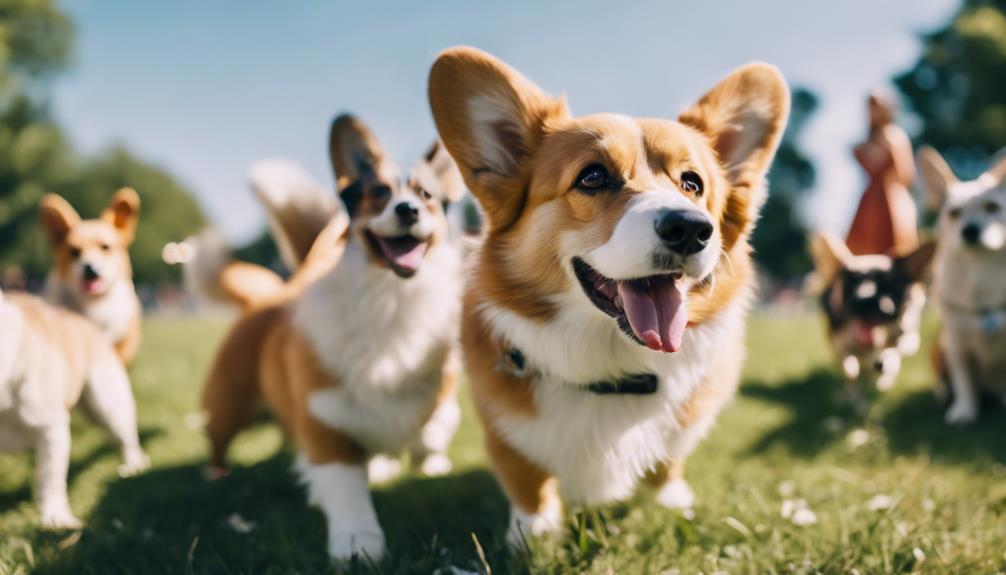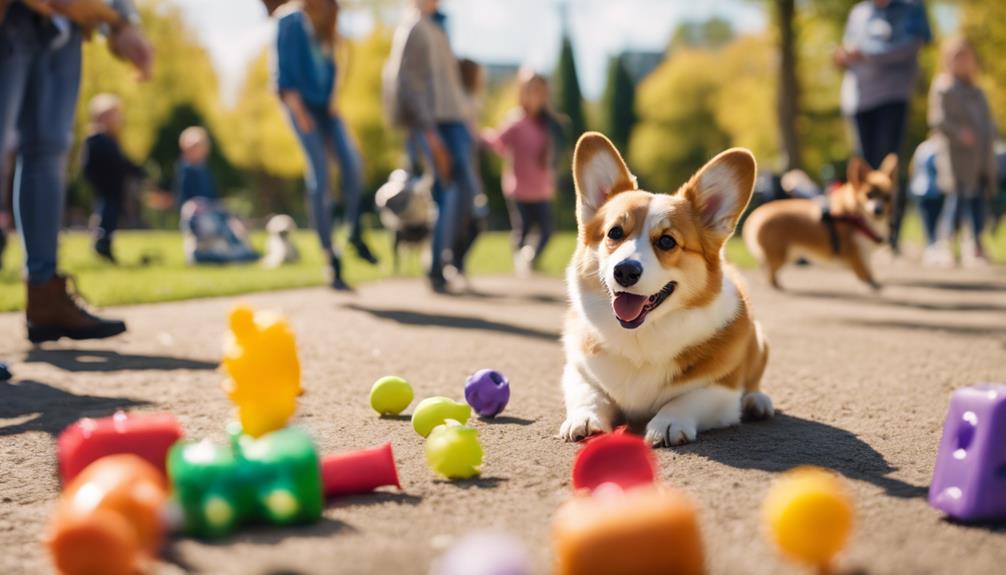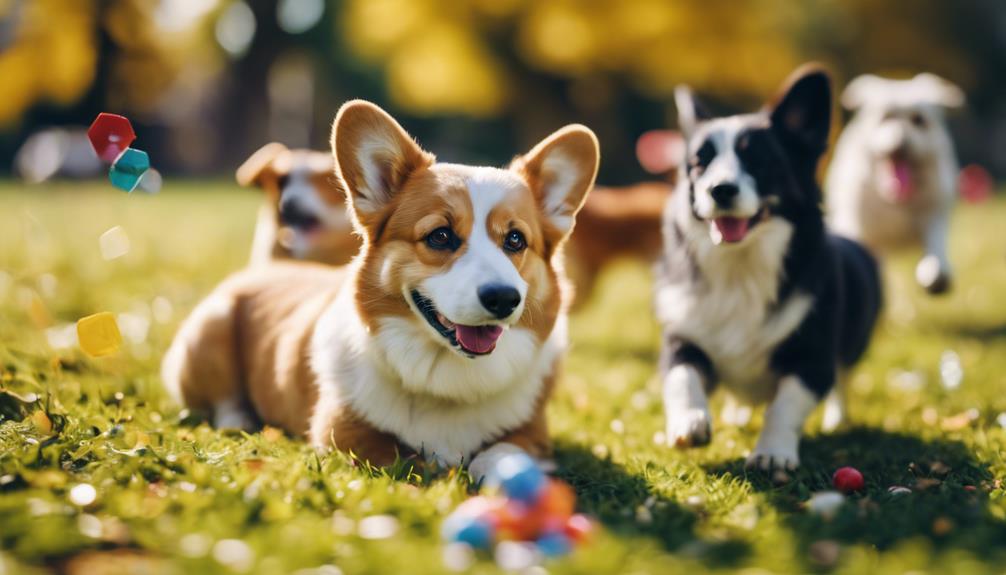Corgis are renowned for their lively personalities and affectionate nature, yet understanding their unique temperament is crucial for effective socialization. Early exposure to various environments and interactions plays a vital role in shaping a well-adjusted adult Corgi. Employing positive reinforcement and structured social opportunities can greatly enhance their adaptability and confidence. However, knowing how to navigate their behaviors, especially in the presence of other pets, is equally important. As we explore practical techniques and insights, one must consider the potential challenges that may arise during this formative process.
Understanding Corgi Temperament

Corgis are known for their lively disposition and intelligent nature, which combine to create a unique temperament that requires careful understanding and management.
Their instincts are a blend of herding and guarding, driving them to be alert and responsive to their environment. This can make them protective over their family and territory.
Corgi communication is essential to their social interactions; they use barks, body language, and facial expressions to convey their feelings. Understanding these cues is vital for effective training and companionship.
Owners should pay attention to their Corgi's needs and behaviors, fostering a positive environment. By recognizing their instincts and communication styles, individuals can better support their Corgis, ensuring a fulfilling and harmonious relationship.
Key Personality Traits of Corgis
Corgis are known for their unique personality traits that make them appealing companions.
Their playful and energetic nature keeps them active, while their intelligence allows for easy training and learning.
Additionally, Corgis are affectionate and loyal, forming strong bonds with their families, which contributes to their popularity as pets.
Playful and Energetic Nature
Renowned for their playful and energetic demeanor, these dogs thrive on interaction and activity, making them delightful companions for families and individuals alike.
Corgis require regular corgi playtime to expend their abundant energy effectively. Engaging in energetic activities, such as fetch or agility courses, not only keeps them physically fit but also mentally stimulated.
These activities promote strong bonds between the dog and its owner, fostering trust and companionship. Corgis enjoy socializing with other dogs, which can enhance their playful nature.
Providing a variety of toys and playmates will ensure your corgi remains engaged and satisfied. Regular exercise and playtime are essential to maintaining their happy temperament, as a tired corgi is a well-behaved corgi.
Intelligent and Trainable Traits
Their playful and energetic nature is complemented by a remarkable intelligence that makes Corgis highly trainable and eager to learn. Corgi intelligence is often evident in their quick understanding of commands and ability to solve problems.
Their trainable traits can be highlighted through the following characteristics:
- Quick Learners: Corgis can grasp new commands with just a few repetitions.
- Versatile Skills: They excel in various activities such as agility training and obedience.
- Curiosity: Their natural curiosity drives them to explore and understand their environment.
- Strong Work Ethic: Corgis often thrive when given tasks, making them excellent working dogs.
These traits not only make Corgis delightful companions but also highly effective in training settings.
Affectionate and Loyal Companions
The affectionate nature of Corgis, coupled with their unwavering loyalty, makes them exceptional companions for families and individuals alike. Corgis thrive on human interaction, often expressing their corgi affection through cuddling, playful behavior, and vocalizations. These dogs form strong bonds with their owners, showcasing their loyalty by following them around and always seeking companionship.
Key traits of Corgis as loyal companions include:
- Devotion: They are known to stick by their owner's side, providing comfort and support.
- Playfulness: Corgis enjoy engaging in activities, making them fun partners for games and adventures.
Importance of Early Socialization

Early socialization is crucial for Corgis, as it occurs during a critical development period in their lives.
Proper exposure to various people, environments, and other animals helps foster positive behavioral outcomes, such as reduced anxiety and improved social skills.
Critical Development Period
During the critical development period, proper socialization is essential for Corgis to cultivate well-rounded temperaments and adapt effectively to various environments and social situations. This phase encompasses critical socialization windows, where experiences significantly shape their behavior. Socialization during this time helps Corgis reach important developmental milestones.
Here are four key areas to focus on:
- Exposure to Different Environments: Introduce your Corgi to various settings, such as parks and busy streets.
- Interaction with Other Animals: Encourage playtime with other dogs to improve social skills.
- Meeting New People: Familiarize your Corgi with diverse individuals to reduce fearfulness.
- Handling and Grooming: Get your Corgi accustomed to being touched and groomed to ease future experiences.
Positive Behavioral Outcomes
Proper early socialization significantly enhances a Corgi's ability to develop positive behavioral traits, leading to a well-adjusted and confident companion. During this crucial time, exposing Corgis to various environments, people, and other animals fosters adaptability. Utilizing positive reinforcement techniques, such as treats and praise, encourages desirable behaviors and builds trust.
Key benefits of early socialization include:
- Improved confidence in new situations
- Reduced fear and anxiety
Behavioral consistency, achieved through regular social interactions, reinforces these positive traits. A well-socialized Corgi is more likely to become a friendly and well-mannered pet, contributing to a harmonious household.
Ultimately, investing time in early socialization shapes a Corgi's long-term temperament and overall behavior.
Socialization Techniques for Corgis
Effective socialization techniques for Corgis involve exposing them to a variety of environments, people, and other animals to foster their adaptability and confidence. Engaging in socialization games and organizing puppy playdates can significantly enhance a Corgi's social skills.
Here are some effective techniques:
- Group Training Classes: Enroll your Corgi in classes to learn basic commands while interacting with other dogs.
- Frequent Outings: Take your Corgi to parks, pet-friendly stores, and busy streets to experience different sights and sounds.
- Meet New People: Encourage friends and family to interact with your Corgi, helping them get comfortable with various personalities.
- Controlled Playdates: Schedule playdates with friendly dogs to promote positive interactions and build confidence.
Implementing these techniques will support a well-adjusted and sociable Corgi.
Corgi Behavior With Other Pets

Understanding how Corgis interact with other pets is essential for creating a harmonious household.
These dogs often exhibit varying behaviors with cats and other dogs, which can influence their relationships and overall well-being.
Corgis and Cats Dynamics
Corgis can exhibit a range of behaviors when interacting with cats, often influenced by their socialization experiences and individual personalities.
Understanding the dynamics of feline corgi relationships can help in facilitating positive interactions. Here are some key points to consider during corgi cat introductions:
- Early Socialization: Introduce your corgi and cat at a young age to promote comfort.
- Controlled Environment: Keep the first meetings in a neutral space to reduce territorial behavior.
- Positive Reinforcement: Reward both pets for calm interactions to encourage good behavior.
- Supervised Interaction: Always supervise initial play sessions to ensure safety and comfort for both animals.
Interactions With Other Dogs
Engaging in interactions with other dogs can significantly influence a corgi's social behavior and overall temperament. At dog parks, it is essential for corgi owners to practice good dog park etiquette. This includes supervising interactions and ensuring that play is safe and appropriate. Corgis, with their natural pack mentality, thrive in social settings but can become possessive or overly dominant if not properly socialized.
To foster positive interactions, consider the following tips:
- Introduce your corgi to other dogs gradually.
- Monitor body language for signs of stress or aggression.
- Encourage play with well-socialized dogs to build confidence.
Corgis and Children Interaction
The interaction between Corgis and children can foster mutual benefits, promoting social skills and emotional development in young ones while providing companionship and playfulness to the dogs.
Corgis are generally friendly and adaptable, making them excellent companions for children.
To ensure positive interactions between Corgis and toddlers, consider the following tips:
- Supervised Play: Always supervise playtime to ensure safety and prevent overstimulation.
- Gentle Engagement: Teach children to approach Corgis gently to build trust.
- Structured Playdates: Organize corgis and playdates to allow for socialization with other pets.
- Training Basics: Introduce basic commands to both children and Corgis for effective communication.
These strategies can help cultivate a harmonious relationship between Corgis and children, enhancing their experiences together.
Signs of a Well-Socialized Corgi

A well-socialized Corgi exhibits confidence in various environments and demonstrates a friendly demeanor towards people and other animals. Signs of good socialization can often be identified through corgi body language. A relaxed posture, wagging tail, and soft eyes indicate comfort and openness.
Additionally, a well-socialized Corgi will approach strangers and new pets with curiosity rather than fear. Socialization age plays a crucial role; early exposure to different experiences helps shape their behavior positively.
A Corgi that is well-adjusted will also respond appropriately when meeting new people, showing enthusiasm without aggression. Overall, these behaviors reflect a Corgi that has received proper socialization, promoting a balanced and happy temperament throughout its life.
Common Behavioral Issues
Common behavioral issues in Corgis can manifest as excessive barking, separation anxiety, or stubbornness, often arising from insufficient socialization or training. These behaviors can lead to challenges for both the dog and the owner. Understanding the root causes is essential, especially concerning aggression triggers and fear responses.
Here are some common issues to watch for:
- Excessive Barking: Often a response to boredom or lack of exercise.
- Separation Anxiety: May occur when left alone for extended periods.
- Stubbornness: Can hinder training efforts, making obedience challenging.
- Fear Responses: Triggered by unfamiliar situations or loud noises.
Addressing these issues early can help create a well-adjusted and happy Corgi.
Training Tips for Corgis

Utilizing positive reinforcement techniques can significantly enhance the training experience for Corgis, fostering a strong bond between the dog and owner.
To improve Corgi obedience, start with basic commands like 'sit,' 'stay,' and 'come.' Use treats or praise as rewards to encourage good behavior. Consistency is key; practice these commands daily for best results.
Additionally, introducing Corgi tricks can make training enjoyable. Tricks such as 'roll over' or 'play dead' stimulate their minds and keep them engaged.
Remember to keep training sessions short, around 5 to 10 minutes, to maintain their focus. Always end on a positive note, rewarding your Corgi for their efforts.
With patience and commitment, you will achieve a well-trained Corgi.
Building a Corgi-Friendly Environment
Creating a Corgi-friendly environment involves ensuring that both the physical space and social interactions cater to their unique needs and energetic personalities.
Corgi proofing your home is essential to keep them safe and happy. Here are four tips to consider:
- Secure loose items: Remove or store things that can be chewed or swallowed.
- Create designated play areas: Set up a space with toys to encourage enriching playtime.
- Use baby gates: Prevent access to areas that might be dangerous or off-limits.
- Provide comfortable resting spots: Make sure they have cozy areas to rest and recharge.

